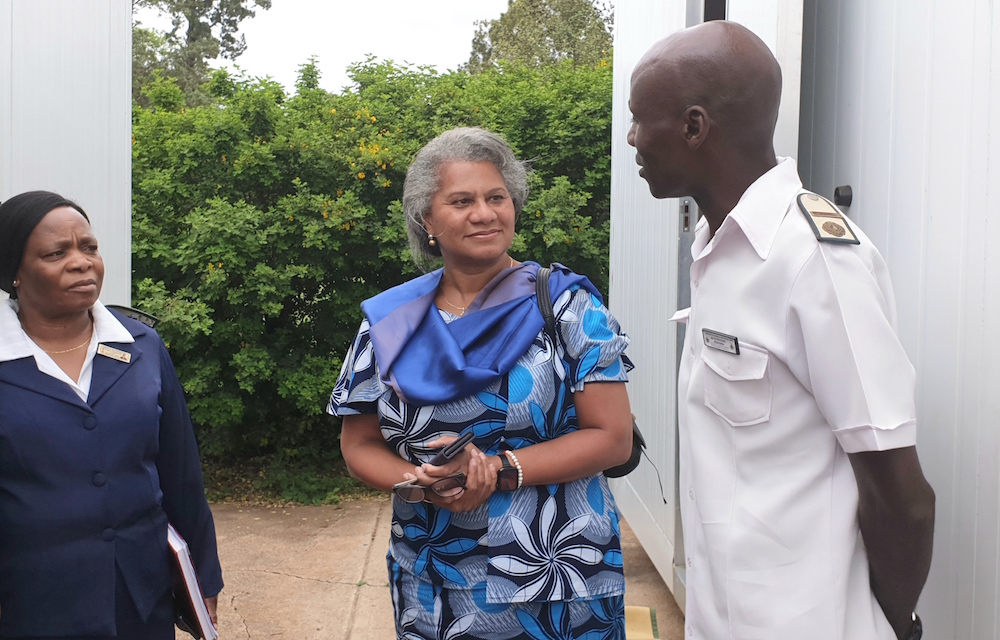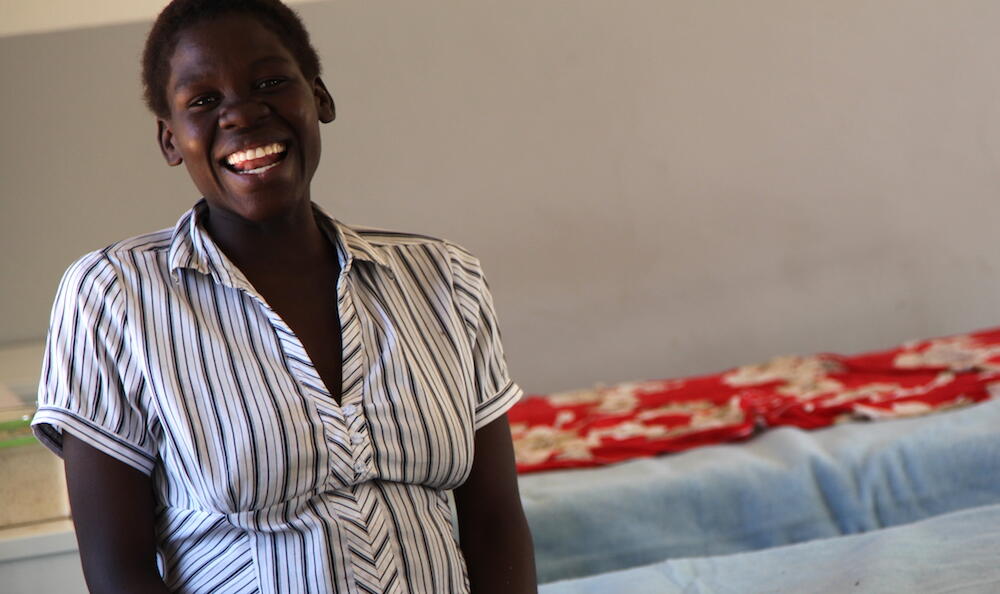HARARE, Zimbabwe—While the COVID-19 pandemic has significantly disrupted people’s way of life, UNFPA in Zimbabwe is determined to continue providing sexual and reproductive health services, including for young people.
Integrated sexual and reproductive health services need to be part of humanitarian and crisis response packages, and it is in such challenging times that these services are often disrupted, leaving many young people and women with limited choices. This can have a significant impact on their lives.
Before COVID-19-related lockdown measures were put in place in the country, many young people were benefiting from free services, like Ndanatsei Chimupiti, a young woman from Hopley in Harare, who could access services such as family planning and free HIV testing at Tariro Clinic and Youth Centre.
Yet due to the current lockdown, UNFPA and youth organizations as partners have had to rethink methods for reaching young people with sexual and reproductive health-related information and services, and find new innovative ways of engaging young people in the country.
To this end, UNFPA and its partners are now focusing on online engagement and mobilization. However, plans to disseminate information to those who are not online, for example through radio, are also in the pipeline.
Serving a population of 147,000, Tariro Clinic and Youth Centre offers sexual and reproductive health information and services to young people from Hopley. The need for young people like Ms. Chimupiti to have access to this is critical, including in times of crisis such as a pandemic-related lockdown.
Access to information and a comprehensive package of youth-friendly services enables young people to make informed decisions about their bodies and the future they seek for themselves. The services offered at Tariro centre have had a significant impact on the lives of Hopley community members, especially its young people.
People can access these services freely and this has [made] a difference to the community.
“This clinic offers services like immunization, antenatal clinics, family planning, and testing for STIs (sexually transmitted infections) and HIV,” said Constance Mataire, Sister-in-Change at Tariro clinic. “People can access these services freely and this has [made] a difference to the community.”
The centre is making a concerted effort to offer integrated services that meet the needs of all. “We are going to reengineer our process to integrate all our services to ensure that all groups of people, such as young people or sex workers, are not being discriminated against or being left behind when it comes to access to sexual and reproductive health services,” said Dr. Nyatsambo, District Medical Officer for Harare South, Harare.
Providing youth-friendly services
As countries grapple with ways to response to COVID-19, it is evident that a strategy for the successful delivery of integrated, quality sexual and reproductive health services to young people remains critical.
How can we better deliver an integrated service for a population group that finds itself in the context of everyday challenges as they navigate the transition from adolescent to adulthood?

“How can we better deliver an integrated service for a population group that finds itself in the context of everyday challenges as they navigate the transition from adolescent to adulthood?” asked Dr. Julitta Onabanjo, then UNFPA Regional Director for East and Southern Africa, now UNFPA Acting Deputy Executive Director (Programmes), during a tour of Tariro Clinic and Youth Centre.
Young people aged 15 to 35 years make up the majority of the population in many African countries. There is therefore a need to ensure that young people of all ages, religious backgrounds, sexual orientation, whether urban or rural based, and living with disabilities, have access to a comprehensive package of youth-friendly sexual and reproductive health services in their communities.
“When I see how many girls are here with babies, I can tell that the prevalence of teenage pregnancy is high,” said Dr. Onabanjo. “These girls should be in school. They should be waiting to have a real relationship and then start having babies. You can’t have children while you’re still a child.”
Not only is there a risk in terms of the outcome of the pregnancy but also in terms of maternal mortality. “A lot of the maternal deaths we see are among young girls, and this we cannot accept,” Dr. Onabanjo said.
A solution to end teenage pregnancy exists. Investments must be made and action accelerated to ensure young people have access to information and sexual and reproductive health services.
Health workers push for youth-friendly package
United Bulawayo Hospital (UBH) is one of Zimbabwe’s three centres of excellence for the integration of sexual and reproductive health, family planning, gender-based violence response, screening for STIs and HIV, and youth-friendly services.
Since we started integration [of services] there have been so many benefits, especially for our clients as [this] has reduced the numbers of times they come to the hospital for different health services.
“Since we started integration [of services] there have been so many benefits, especially for our clients as [this] has reduced the numbers of times they come to the hospital for different health services. They get them all at once,” said Abigail Mafaro, Nurse Manager at the hospital.
The feedback has been positive. It costs clients less in transport if they are able to get all the services they need in one visit, as opposed to multiple visits for each different service required.
“UBH has not only managed to improve fistula management among women but also as a tertiary hospital it has managed to cascade screening and raise awareness of cervical cancer among women, as 100,000 women have been attended to,” said UBH gynaecologist Dr. Collen Nyatsambo.
“What we have seen here in terms of UNFPA support is real potential for full integration of sexual and reproductive health services, including HIV, adolescent and youth-friendly services and gender-based violence,” said Dr. Onabanjo during a visit to the clinic.
However, a number of gaps remain.
“UNFPA will be working together to make United Bulawayo Hospital a people-centred facility that responds best to the needs of all in terms of their sexual and reproductive rights,” Dr. Onabanjo said.
The hospital is also a health worker training centre on cervical cancer screening.
- Derick Nyasulu


